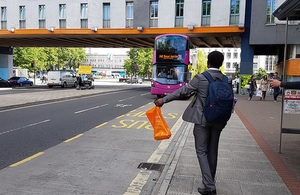Passengers to plan journeys down to the minute as big data revitalises country’s bus use
Launch of Bus Open Data Service in early 2020 could be the start of a golden age for buses.

-
government brings buses into the digital age with open data project to improve passenger journeys across England
-
information on routes, timetables, location and fares will be easier to access to make bus travel more convenient
-
the Bus Open Data Service will be launched in early 2020
Bus passengers across England will soon be able to plan their journeys down to the minute thanks to a pioneering project to collate and share bus location data.
Buses Minister Baroness Vere has announced a ground-breaking project to standardise and publish information from operators, which will enable bus users to plan routes, estimate journey times and understand costs in advance. It will also provide real-time bus location data so that passengers can travel with confidence. Information on routes and timetables will be available from early 2020, followed by location and fares data by 2021, encouraging more people to choose buses by making them easier to use than ever.
Developers will be able to add the information into existing apps or develop new products to improve connectivity for communities and encourage more people turn to public transport.
Buses Minister, Baroness Vere, said:
Buses are the most frequently used form of public transport – to get to work, to the library, to the doctors or to see family and friends.
By harnessing the transforming power of data and technology we could be on the threshold of a golden age for buses. Sharing data on routes, bus locations and fares will give passengers even more confidence to ride.
Only half of bus users think that it is easy to stay up to date with timetables and fares, impacting the number of journeys taken and the user experience, according to Transport Focus.
The Bus Open Data Service will be underpinned by new regulations which will mean bus operators are legally required to provide route and timetable data by the end of 2020 and fare, ticket and location data by 2021.
The new regulations will make it easier for people to use the bus to visit friends, commute to work or get out and about in their local community by providing live information on location, and helping to keep fares down by providing greater transparency across different operators.
David Sidebottom, director, Transport Focus, said:
Making it easier for passengers to find bus times and fares is good news. Ensuring that information is accurate and timely will be crucial to the success of the open data service.
The government will work with technology companies, app developers and information providers to ensure a range of innovative products are designed to make the most of the data and help all bus users make informed choices.
Full data on fares and locations will be available from January 2021, by which point it is expected that a range of apps will be on the market, allowing passengers to manage their journeys from start to finish from their smartphones.
David Beardmore, commercial director, Open Data Institute, said:
Having been involved in the bus open data programme from the start, we’re delighted to see this significant step forward with the launch of the bus open data service in early 2020 as planned.
This marks the start of a digital transformation for the delivery of bus services across England and will benefit both the tech industry who will use the data to innovate and develop new products and services, but fundamentally consumers are the ultimate winners; armed with better information they can plan their journeys more easily and make better choices about tickets.
This follows the government’s recent announcement of new low-fare, high-frequency ‘Superbus’ networks, Britain’s first all-electric bus town and contactless payments on every city bus.
The package is worth £220 million in the first year, and will create ‘express lanes’ for buses in the West Midlands and elsewhere, and will invest in new ways of providing more frequent public transport in the countryside and other places where conventional buses have dwindled or disappeared.
The government has also committed to the UK’s first-ever long-term bus strategy and funding settlement, including support for councils who want to create London-style franchised services in their areas.
Roads media enquiries
Media enquiries 0300 7777 878
Switchboard 0300 330 3000